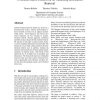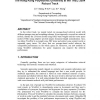108
Voted
CIKM
2010
Springer
15 years 1 months ago
2010
Springer
The probability that a term appears in relevant documents ( ) is a fundamental quantity in several probabilistic retrieval models, however it is difficult to estimate without rele...
106
Voted
IR
2000
15 years 2 months ago
2000
In classic InformationRetrieval systems a relevant document will not be retrieved in response to a query if the document and query representations do not share at least one term. T...
128
Voted
IPM
2006
15 years 2 months ago
2006
This paper presents a probabilistic information retrieval framework in which the retrieval problem is formally treated as a statistical decision problem. In this framework, querie...
100
click to vote
IPM
2006
15 years 2 months ago
2006
Content-oriented retrieval models are based on a document-term matrix, whereas link-oriented retrieval models are based on an adjacent (parentchild) matrix. Term frequency and inv...
109
click to vote
CLEF
2010
Springer
15 years 3 months ago
2010
Springer
This technical note presents the system built for the IP track of CLEF 2010 based on PATATRAS (PATent and Article Tracking, Retrieval and AnalysiS), the modular search infrastruct...
112
Voted
TREC
2004
15 years 3 months ago
2004
In the robust track, we mainly tested our passage-based retrieval model with different passage sizes and weighting schemes. In our approach, we used two retrieval models, namely t...
ECIR
2006
Springer
15 years 3 months ago
2006
Springer
We present a prototype system using array comprehensions to bridge the gap between databases and information retrieval. It allows researchers to express their retrieval models in t...
134
Voted
IRCDL
2008
15 years 4 months ago
2008
This paper discusses some issues related to the planning of a series of grid experiments in the context of the TrebleCLEF project with the aim of improving the comprehension of Mul...
116
Voted
CLEF
2008
Springer
15 years 4 months ago
2008
Springer
Metasearch engines submit the user query to several underlying search engines and then merge their retrieved results to generate a single list that is more effective to the users&...
128
click to vote
CIKM
2008
Springer
15 years 4 months ago
2008
Springer
Structured documents contain elements defined by the author(s) and annotations assigned by other people or processes. Structured documents pose challenges for probabilistic retrie...


